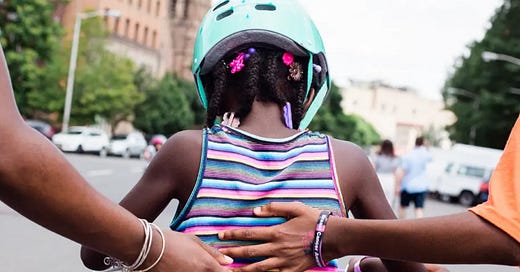Why America needs more “civicians”
Plus, connection across difference in the U.S. and Citizen University
There is a truism in neighborhoods and community groups: 10 percent of members shoulder 90 percent of the community-building work. Peter Levine has called these civic glue people the “civic one million.” David Brooks has called them “weavers.” This week, Ted Johnson and Autumn McDonald propose a new identity, “civicians,” and argue that we need more of them, quickly.
In honor of this quest to create a sticky civic identity—and a more engaged, connected, and caring citizenry—we’re featuring reads this week that raise a few related questions:
What is a “civician” and why does America need more of them?
How can we create more “civicians” in our communities?
What prevents us from connecting with one another, particularly across difference?
What do you think? Will creating a compelling civic identity encourage more people to become community-builders? Can these civic and community-building skills be taught? As always, we’re interested in your musings—whether they be supportive or constructive.
Your newsletter neighbors,
Sam, David, + Eric
The Reads
The Washington Post - “To find what society needs, look on the sidelines of kids’ soccer” by Ted Johnson & Autumn McDonald (Dec. 2023)
According to the authors, our communities need more “civicians”—people who “care enough to ensure meals are brought to a grieving family,” “who don’t stand idly by when intolerance and discrimination are directed at members of, or beyond, their community,” and “whose concern does not stop at the end of the block or extend only to people they know.” These civicians understand that “social trust is built not by exchanging favors, but by doing for others and expecting nothing in return.” To Johnson and McDonald, it is these civicians who can be “rehabilitative” in this moment “when society needs repairing.”
The Work
Citizen University - National
Citizen University is trying to create more “civicians”–or as they call them, “civic catalysts”—by equipping neighbors with the ideas, strategies, and spirit to build a culture of powerful, responsible citizenship in cities across the country.
Citizen University sees their work as countering a culture of hyper-individualism, cynicism, and powerlessness with one of powerful, responsible citizenship. The organization has four key initiatives to drive this work forward:
Civic Saturday Fellowship, which trains Americans to host “Civic Saturdays”—gatherings designed to rebuild belief in our civic institutions and in each other—in communities across the country.
Citizen Redefined, a curriculum designed to provide a pathway for young Americans (ages 14-24) to create and ceremoniously grow into their civic identity.
Youth Collaboratory, a cohort-based fellowship for teenagers to learn how to build civic power with one another and make positive change in their communities.
Civic Collaboratory, a mutual aid society and a project incubator for civic innovators, where participants offer hard commitments of help and support.
You can learn more about how Citizen University thinks about the connection between isolation, loneliness, and participation in this NPR interview. And, if you’re interested in getting involved, you can check out their website to sign up for future events and apply for one of their programs.
The Research
More in Common - “Social Connection Across Difference in the US” (Nov. 2023)
More in Common, a nonpartisan research nonprofit, just published the results of a pilot study which sought to answer the question: who is interested in connecting across difference in the US and why? Here are a few takeaways from the polling that we found interesting:
More than 70% of Americans report wanting to connect across lines of difference, but only 40% actually do so. A majority of all racial groups (70%+), democrats (82%), and republicans (61%) express interest in connecting across lines of difference. Yet, a minority of people actually do. People interact across lines of racial difference the most (44%), compared to socioeconomic (40%), religious (37%), and political differences (34%).
The primary reason people do not actively interact across political differences is lack of energy. Respondents across the political spectrum described fears of getting in arguments and shouting matches, receiving verbal threats or physical violence, and feeling misunderstood by others.
In contrast, the number one reason people do not actively interact across racial, religious, or socioeconomic differences is lack of opportunity. As one respondent named Pauline shared, “I spend my time at work with people in a similar economic situation as myself, then my free time with people I've met from hobbies and clubs—all which mean I am usually surrounded by people in a similar socioeconomic background."
What will it take to get more Americans to connect across difference? If we’re to believe the polling respondents (always a leap of faith), the answer, here, appears to be structural. To that end, future research should explore the specific structural barriers that limit opportunities for these forms of bridging connection.
If you’re interested in learning more about the study, you can view the full report here and tune into their webinar tomorrow at 12PM ET by RSVP-ing here.
Have feedback on the newsletter? Want to share content for us to feature? Interested in getting involved as a contributor? Email us at theconnectivetissue@gmail.com.






